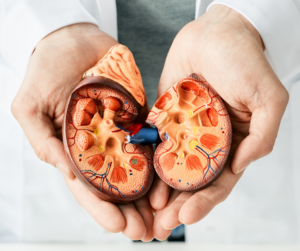How Aging Affects Kidney Function and How Elder Care Can Help
 There are many changes that happen within the body as it ages, and the kidneys are one of the most important but often overlooked organs affected by these changes. The kidneys help to filter waste, balance fluids, and regulate blood pressure. However, aging can impair kidney function, raising the risk of renal disease and its complications. Fortunately, elder care can help seniors understand the importance of renal health, and how aging affects the kidneys, and encourage them to talk with their medical team about any concerns they may have.
There are many changes that happen within the body as it ages, and the kidneys are one of the most important but often overlooked organs affected by these changes. The kidneys help to filter waste, balance fluids, and regulate blood pressure. However, aging can impair kidney function, raising the risk of renal disease and its complications. Fortunately, elder care can help seniors understand the importance of renal health, and how aging affects the kidneys, and encourage them to talk with their medical team about any concerns they may have.
How Aging Impacts Kidney Function
The kidneys contain millions of small filtering units known as nephrons, which function to eliminate waste and excess fluid from the circulation. Over time, the quantity and efficiency of these nephrons decrease, resulting in a steady deterioration in kidney function. This means that seniors may have a tougher time removing pollutants, increasing their susceptibility to renal issues.
Aging can also cause changes in the arteries, especially those supplying blood to the kidneys. Reduced blood flow can affect kidney function, making it more difficult for the body to maintain correct fluid balance and control blood pressure effectively. Additionally, seniors are more likely to develop illnesses such as high blood pressure, diabetes, and heart disease, all of which have a negative impact on renal health. For example, uncontrolled diabetes can harm the kidneys’ filtering units, while excessive blood pressure can place added pressure on renal function.
Finally, many seniors are prescribed medications for a variety of health issues. Some medications, such as pain relievers (NSAIDs) and some antibiotics, can be harsh on the kidneys, raising the risk of renal damage. Not only that but the kidneys’ ability to filter medications deteriorates with age, requiring regular monitoring and dosage modifications.
How Elder Care Can Help Seniors Improve Kidney Health
Elder care offers valuable support for seniors in many ways, including helping them to improve kidney health. Some of the most common ways they help with this include the following:
- Encourage a Kidney-Friendly Diet: Diet has an important influence on kidney health. Seniors should be encouraged to eat kidney-friendly meals, including fresh fruits and vegetables, healthy grains, and lean protein. Limiting salt, processed meals, and foods high in phosphorus (such as dairy and soda) can help to relieve renal strain.
- Monitoring Hydration: Proper hydration is vital for kidney health. Unfortunately, many seniors struggle with knowing when they’re thirsty for various reasons. Elder care ensures that seniors drink enough water throughout the day to assist their kidneys in eliminating pollutants, as well as offers alternative recommendations, such as soup, watermelon, cucumber, and herbal tea for seniors who might not like drinking plain water.
- Managing Chronic Conditions: Keeping diabetes and high blood pressure under control is essential for kidney health. Regular blood sugar and blood pressure monitoring, together with medication management and lifestyle changes, can dramatically minimize the risk of renal disease progression. Elder care can encourage seniors to stay on top of these things and ensure they schedule and keep all necessary medical appointments.
- Promoting Physical Activity: Exercise promotes overall health, including improved blood circulation and blood pressure regulation. Even simple activities such as walking or stretching can improve kidney function and general health.
Aging inevitably impairs kidney function, but with support from elder care, collaboration with the medical team, and lifestyle changes, seniors may protect their kidney health and maintain a high quality of life.
